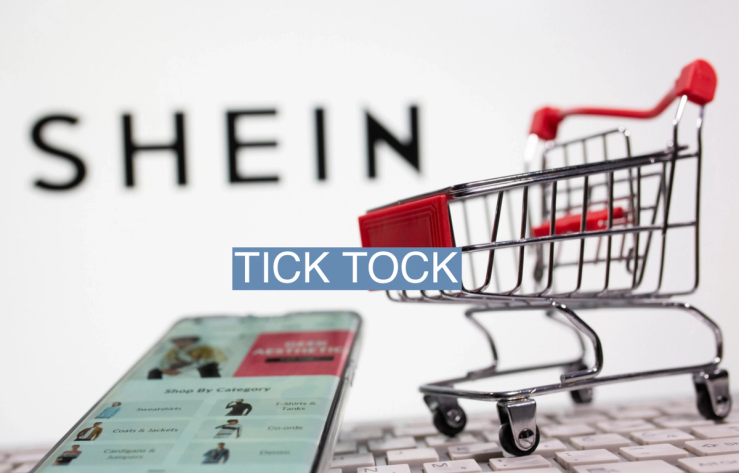The Scoop
As U.S. lawmakers weigh the possibility of banning TikTok, opposition is growing in Washington toward another Chinese-owned tech firm: Shein.
The fast-fashion giant, backed by Sequoia Capital China and General Atlantic, is one of the most popular shopping platforms among U.S. consumers. But it has received relatively little scrutiny until recently, driven in part by a campaign targeting Shein’s Chinese origins — one of its main offices is in Guangzhou— and drawing comparisons between the company and TikTok.
Last month, an anonymous coalition of “like-minded individuals and businesses” emerged in D.C. calling to “Shut Down Shein” for engaging in what the group alleges are “dangerous and reprehensible” practices like anti-competitive behavior.
“TIKTOK IS THE NEEDLE, SHEIN IS THE DRUG,” reads the Shut Down Shein website. “TikTok and Shein, controlled by the [Chinese Communist Party], are trying to capture an entire generation of American youth. And in a way, they already have.”
It’s not clear who is funding Shut Down Shein, but the campaign is being run by Washington lobbying and strategy firm Actum. In recent weeks, Actum’s government relations team has held meetings about Shein with Republican Senator Bill Cassidy’s office and with a prominent new U.S. House select committee on China run by a critic of Beijing, Actum managing director Chapin Fay told Semafor.
Fay claims that Shut Down Shein is backed by American brands and human rights organizations, and says it is gearing up to launch a digital advertising blitz in Washington. The goal is to bring Shein “out of the darkness” and potentially force the company’s reclusive CEO, Chris Xu, to testify before Congress, Fay says. After years of pressure, TikTok’s chief executive finally appeared before lawmakers last month.
“SHEIN proudly provides customers with on-demand and affordable fashion, beauty and lifestyle products, lawfully and with full respect for the communities where we operate,” a Shein spokesperson said in a statement. “We categorically deny these false and baseless claims, and will not hesitate to take swift action to protect the rights of the company.”
Know More
A bipartisan group of elected officials cited Shein in a letter to the Department of Homeland Security earlier this week about the continued import of products from China’s Xinjiang region, which Congress outlawed over a year ago due to concerns about forced labor.
The lawmakers zeroed in on an obscure trade statute that has benefited Shein, referred to as the de minimis rule. Originally intended for tourists coming back to the U.S., it allows companies to ship products from overseas directly to individual consumers without paying tariffs, as long as their value is less than $800. Shein often sends packages to customers from China, meaning it can avoid taxes that its brick-and-mortar competitors are required to pay.
But lawmakers are worried that the de minimis threshold may be allowing Shein, as well as another popular Chinese-owned shopping app, Temu, to continue importing goods from Xinjiang. The region is one of China’s top producers of cotton and where the United Nations alleges the Chinese Communist Party has carried out human rights abuses against mostly Muslim minorities.
A separate group of lawmakers, including Cassidy, and Democrats Elizabeth Warren and Sheldon Whitehouse, sent a similar letter to Shein’s CEO in February asking about its use of Xinjiang cotton. Shein sent back a response in March detailing its supply chain tracing programs, according to a person familiar with the matter. Only around 4% of the company’s products are made from cotton, while the rest are synthetics like polyester, the person said.
Louise’s view
Shut Down Shein is betting that lawmakers will be willing to extend their national security concerns about TikTok to other Chinese tech companies. It’s an opportunistic strategy that could wind up engulfing a number of other firms from the People’s Republic, regardless of their actual business practices or corporate track record.
Shein pioneered a unique business model that involves working with thousands of different suppliers, but it otherwise operates mostly the same way as competitors like Zara or H&M. Other online retailers, such as eBay and Amazon, also benefit from the de minimis threshold in the same way Shein does.
But Shein may be more vulnerable to public criticism than TikTok or other Chinese companies. I have spoken to many of its young American customers, and they frequently voiced serious concerns about Shein’s labor practices and the impact that fast-fashion is having on the environment. I’ve found that TikTok users often have fewer misgivings about continuing to use the app, despite the current rhetoric in Washington.
Room for Disagreement
There is one area where Shein stands out from other fast-fashion firms. Over the past few years, it has been named at least 50 times in U.S. lawsuits alleging trademark or copyright infringement, The Wall Street Journal found. The incidents have helped damage Shein’s reputation in some online fashion circles and made it difficult for the company to gain consumers’ trust.
In one of the latest examples, a British nail artist accused Shein of ripping off her work. “Not only have they copied the design, but they’ve used the picture that I’ve taken of my clients’ hands as well,” Yan Tee told the BBC. Shein says it takes infringement claims seriously.
The View From India
The Indian government banned Shein’s app from the country in 2020, along with TikTok and a host of other Chinese platforms. Homegrown fashion startups like Newme and Virgio are now raising venture capital to fill the gap in the market, The Economic Times reported earlier this week. But Shein products never really left India — the company continued selling them through Amazon.
Notable
- Bloomberg tested garments from Shein on two occasions last year and found they were made with cotton from Xinjiang. The company did not dispute the results.
- Shein is aiming to raise $2 billion in a new funding round and preparing to go public in the U.S. later this year, Reuters reported in March. “We currently have no plans for an IPO,” a spokesperson for Shein told Semafor.


